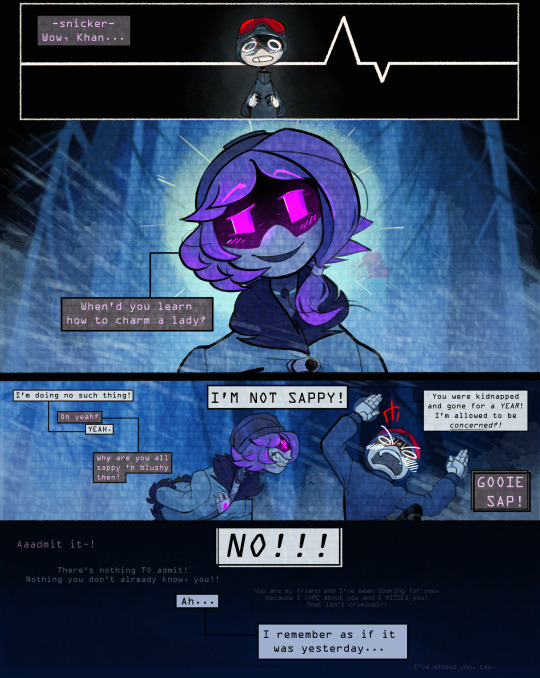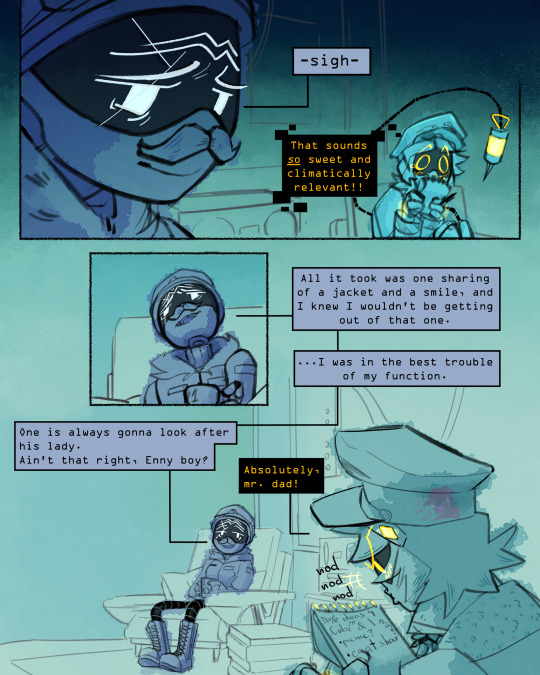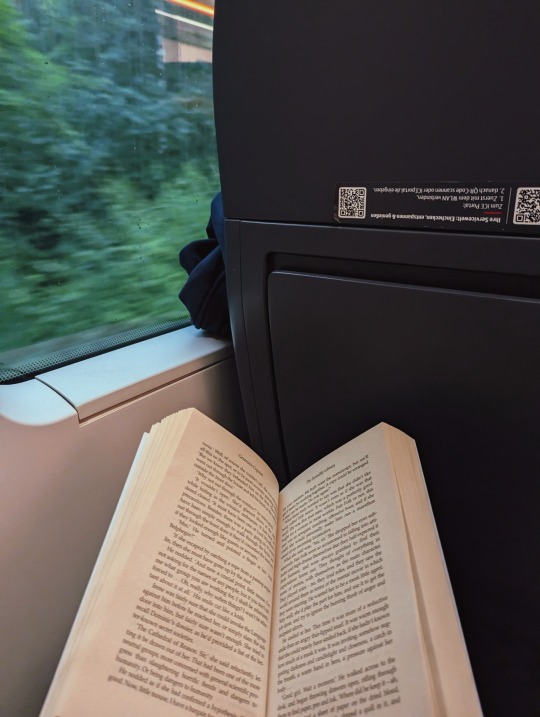#I'm not a linguist
Explore tagged Tumblr posts
Text
Another thing about Swedish pronouns that I realized might be interesting: In Swedish, there are two translations of "it": "Det" and "den". And the thing is, there's no rule for what nouns are "det" or "den", aside from "if the definite article version of the word has a '-t' suffix it's a 'det' word, and if the suffix is '-n' it's a 'den' word." But there's no universal rule for which words ends with "-t" or "-n", you just have to check the word in a dictionary or know it yourself.
What I'm getting at is, if you happen to use the "it" pronoun for yourself and want to talk about yourself in Swedish, you're going to have to decide if you're a "det" or a "den".
If it's any help, the Swedish words for "thing", "machine", "computer", "car", "cat" and "dog" are "den" words, while the words for "tree", "animal", "lion", "house" and "table" are "det" words, just to pick a few examples from the top of my head. Different Swedish words for "creature" are either "den" or "det".
As a bonus, the term "doing it" as an euphemism for sex is "göra det" in Swedish.
And Stephen King's novel "It" has the title "Det" in Swedish.
#language#Swedish#pronouns#it#den#det#I'm not a linguist#so I might have gotten some of the linguistic terms wrong
9 notes
·
View notes
Text
From learning a Sci-Fi script to picking up a Con-Lang (or, a very long very nerdy Star Wars rant)
I need to rant at this to the void, and this blog is my go-to for these things. I feel free to do so since no-one comes here anyways.
A bit of background
(or, the part you can skip if you want to get to the nerdy rant now): I've been into Star Wars on and off since my teens. I'm nearly 40, so that's a few decades. I do watch the new series, and became very fond of "The Mandalorian" really fast. In-between seasons, my spouse and I also re-watched most of Clone Wars. In early 2024, we started a Star Wars 5E TTRPG campaign with a friend, where my spouse DM's, Friend plays a Jedi, and I play a Mandalorian (and she's just so much FUN to play). My character is one I came up with around... 2017? Maybe? IDK if you can find her if you scroll down far enough. Currently re-designing her, though. I originally came up with her after working my way through the Travis books and becoming fascinated with Mandalorians for some reason.
Accidential Language Acquisition
My latest obsession (and distracion from the summer heat) started with me looking up some Mandalorian phrases and curses for RPG purposes. Yes, I know, none of this is canon any more. None of us cares. We kind of make our own canon. Then I found out there's a script - and I was lost. I loved codes and obscure scripts as a child, and I did learn to read Hiragana in my 20s, so how hard could this be? I looked for a chart and found this site, which offers practice reading (and a dictionary, amongst other stuff). So, I started learning the characters in, I think, late July. I read quite well by now, my writing does lag behind. Juuust... the practice phrases are written in the Mandalorian language.
I didn't set out to learn a constructed language. I really did not. I just wanted to know WHAT I was typing. So I looked up the sentences on the cheat-sheet after I got them right. And some words started repeating, and I picked them up. Kinda automatically. I swear, I only practice reading/ writing this for like 15 to 30 minutes a day. After a while, I half-understood what some sentences said. Reading Star Wars fanfiction did not help (or help a lot, depending on your POV) there. I looked up missing words, building a bit of a vocabulary. It's erratic still, but I noticed something. In conversations, my brain sometimes supplies the Mandalorian words I know now. (I usually do catch myself, although stuff tends to slip in when I'm alone with my spouse, to his amusement.) My language center does not know this is a con-lang, after all. I also tried to write a ransom note in Mandalorian, which was a fun experience (for a private project). Through fan fiction and looking up stuff, I also learned about the Legends version of Mandalorian culture. That stuff is fascinating, although I feel like a visitor to an abandoned city. Everyone's gone (since Legends is out of print and stuff is falling into obscurity), but it's still cool to look around. It gives me a kind of bittersweet, nostalgic feeling, too. So many passionate minds, and things I'm so happy to experience, but wished I knew about sooner. Aay'han, if you will, only it's memories I never made. Nostalgia for what could have been. Not gonna lie, I'm obsessed. It's a feeling I seldom get now, although it was quite frequent when I was a teen. It feels great and enjoyable and unhealthy and I think I need to stop. I'm an adult, and I'm too old to fangirl. Or, at least, I keep telling myself this.
Analyzing a Con-Lang because my nerd brain can't stop looking for patterns
Mandalorian actually HAS different words for the people, the planet, the ruler, and the language. Let me start with Manda, which is the collective soul (or the concept of) of the Mandalorian people. The people themselves are Mando'ade (Children of the Manda/ of Mandalore. Singular Mando'ad). The language is Mando'a (no clue why, language would be joha. Maybe Mando'joha was too long and it got shortened). The planet is Manda'yaim (yaim meaning home. Simple enough). The ruler is the Mand'alor (alor meaning, well, leader. Also simple).
Before long, my brain started making connections between some things. Simple things first - "Ke" or "K' " at the start of a sentence is always the imperative form of something ("Command form"). The words for "you", "I", and the third person pronoun. Then, between words, trying to fit new words with what I already know. Like [something] ad was most likely about people. I built myself bridges that are just theories - I am not a linguist in any fashion, and I'm just trying to make sense of what's there. Like mirsh meaning brain(cell), kot meaning strenght, and mirshko is courage - so, "brain-strength"?
And no, for all of you out there that are as nerdy as me, this is not a full language. There isn't a word for "call" or "get in contact with" I could find, for example. Some authors just wanted to add flair to their writing, so an incomplete thing is what we have. Even so, I am kind of hooked in the weirdest way. I play around, trying to make my own sentences and combined words. It's fun, and private, and nobody needs to know. Except for the two people I TTRPG with.
IDK any more where I wanted to go with this. There might be a part 2, someday. If anyone read this, I appreciate you. If anyone read this and had this weird kind of obsession happen to them as well, let's talk. It might just be the universe's weirdest midlife crisis.
#rant post#star wars rant#fictional language#mando'a#I'm not a linguist#conlang#my newest obsession#obsession rant#kind of a diary entry#ranting to the void
9 notes
·
View notes
Text
btw
My comments thus far have been based around the subs that Hulu lists. I'm aware there are a couple of other translated subtitles floating around, and they may be better or they may be worse. I'm just working with what I've got.
#I should mention that I am in no way qualified to comment on this kind of thing#I'm not a linguist#I just don't sleep enough#they are related disorders but only one of them produces useful members of society#trigun#tristamp#trigun stampede
4 notes
·
View notes
Text
Weird they would go to Jerry about that and he would use the formal you:
"He thoued me, Jerry?"
"Thoust got thoued?"
"Thoued!"
"Wow."
Shakespearean Seinfeld episode like:
"He thoued me, Jerry."
"He thoued you?"
"He thoued me!"
2K notes
·
View notes
Text
fact: when pidgin dialects involve english, -glish becomes the suffix, eg: chinglish, konglish, hinglish fact: slash pair name order puts the top first and the bottom second, eg: deancas vs casdean conclusion: english is an uke language and that’s why we have an omegaverse, not an alphaverse
#fandom#language#linguistics#shitposting#I posted this to bluesky first but it deserves a wider audience because I'm Right goddamit#omegaverse
8K notes
·
View notes
Text




coat
#md#murder drones#khori#khan doorman#nori doorman#nuzi#n x uzi#serial designation n#md n#uzi doorman#ship of theseus au#ignore the au tag for now. the cooking is Uncertain but desire for organisation & ticket out of canon-obligation burns bright.#my art#''mr. dad'' is in reference to the polish dub. i'm linguistically biased towards it.
3K notes
·
View notes
Text
AuDHD is so funny sometimes like what do you mean my hyperfixations/special interests will last for years on end or possibly forever but they will cycle out every month or two with absolutely no transitional period or warning. like i will think about the same topic every day obsessively for 46 days in a row and on the 47th day with no visible cause adhd brain goes "ok! bored of that now" and autism brain goes "dw i got something queued up for ya" and i blast into full blown obsession on some other topic whose mental file folders haven't opened in 9 months. brain's out here treating hyperfixations like a crop rotation. once the dopamine runs out it cycles in another one but once something's in the rotation it never ever leaves. last summer we brought in one from when i was 11. it's so funny to me but frustrating too bc like. i cannot stress enough my inability to predict or control this. or how completely abrupt and random it can be
#actually adhd#actually autistic#audhd#aphelion.txt#ik 'adhd brain' vs 'autism brain' is a gross oversimplification especially given how much overlap there can be#but it at least helps me conceptualize wtf is going on in my head when i do this lol#and yeah i'm mostly referring to fandoms in this post but it can happen w more 'Traditional' special interests too#like my linguistics special interest which hasn't popped up in a couple years now but whenever it does#i will fill literal notebooks while studying 4 languages at once and simultaneously inventing a conlang#and then i'll be like Ok that was fun! and several months later im deleting like. 2gb of textbooks off my iphone to make room for an update#And sometimes yeah there is a precipitating event like 'Oh something new happened in X fandom with my blorbo!' but sometimes it's like#yeah. no. idk either. switch got flipped in my brain and X no longer sparks joy. only Y rn. how come it's Y? yeah idk i also wish i knew#i don't think any of this is actually an uncommon experience for people with these types of neurodivergencies it's just.#the severity of abruptness and TOTALITY of the switch that makes me feel like a weirdo sometimes lol#like I'M getting mental whiplash from this sometimes. idk how y'all are still following my blog
7K notes
·
View notes
Text




23.08.24 i am currently enjoying my exam/term paper-free life by working too much, cleaning to de-stress and finally getting back into reading (bought piranesi by susanna clarke yesterday, very excited). my first master's semester is slowly approaching and the courses all look promising. also, looking forward to autumn!
🎧 - the wolf by siamés
#it's hard to make study posts when i'm not studying#studyblr#langblr#aesthetic#study aesthetic#study inspiration#studying linguistics#studying english literature#studyspo#academia#jaystudies
1K notes
·
View notes
Text
sometimes i just sit and think about the deep well of linguistic and cultural information contained in the pithy football phrases "war damn" and "who dat"
#i'm a linguist AND a southerner i contain multitudes#you know what i'm adding “geaux tigers” to the list too#and more generally the popularity of -eaux in louisiana
451 notes
·
View notes
Text
Huge news for people interested in similar things to this blog, the Say Something In Welsh team is launching an Irish language course! Resources, especially listening resources have been quite hard to find in Irish, I know way more people that can read and write in Irish than speak it with any confidence at all, and the Say Something method gave me so much more confidence in my own Welsh speaking, I imagine then coming into the Irish language teaching space is a really good thing.
Their founder Aran Jones says they've been in talks with the Irish government for 'copromotion', and while I'm not fully sure what that entails, it must be a road to having more and more widely available, quality learning resources for Gaeilge.
Since this blog is followed not just by Welsh learners, but a lot of people generally interested in language learning and Celtic studies, thought I'd mention it here! Dyn ni'n dod nôl i feddwl yn Gymraeg yn fuan, dwi'n siwr :)
#language learning#resources#welsh#Irish#language resources#linguistics#language#celtic languages#ireland#Gaeilge#languages#Welsh#Cymru#cymraeg#langblr resources#I'm excited about it. I'll probably give it a shot#Say something in Welsh
280 notes
·
View notes
Text





PAINLAND WEEK - DAY TWO - MYTHS/LEGENDS → Sophus Helle, Gilgamesh — tablet XII, lines 87-95
#dead boy detectives#painlandweek#payneland#dbda#charles rowland#edwin payne#jayden revri#george rexstrew#dbdagifs#mygifs#dbdaedits#myedits#dbda and gilgamesh#if there's any babylonian scholars in the fandom#im sorry i tried my utmost best#my linguistics degree did not entirely prepare me for this#i did hours of research for this and i'm not even sure the cuneiform is right#because i could not find any visual documentations of these lines on tablet xii#and so i was relying on a.r. george's 2003 'the babylonian gilgamesh epic'#along with an akkadian dictionary and ePSD#and even then i'm not sure i have the right characters
851 notes
·
View notes
Note
hope you feel better soon!

I am riddled with ailments, but I stay silly!
#ask#non mdzs#My health journey has been: Hernia -> acid reflux -> Vocal pain due to aforementioned reflux -> chest infection.#I'm terrified to know what's about to hit me next. Please let it be something kind. PLEASE.#The consequence of living with linguists is that you'll wake up with a wacked up voice -#suddenly you're sitting you down in front of a program called something like Praat having your shimmer and jitter levels calibrated.#They gave me a GRBAS of 33012. I have a fun thing called a pitch break where a whole octave just does not exist.#My vocal pain was bad enough I ended up seeing a speech pathologist and that whole experience was super neat!#I learnt a lot about voice - to be honest I might make a little comic on it after some more research. Fascinating stuff.#For example; your mental perception of our voice modulates the muscles of the vocal folds and larynx.#meaning that when you do have changes (inflammation = more mass = lower frequency)#your brain automatically attempts to correct it to what it 'should sound like'. Leading to a lot more vocal strain and damage!#And it gets really interesting for trans voice care as well - because the mental perception of one's voice isn't based on an existing sampl#So a good chunk of trans voice training is also done with the idea of finding one's voice and retraining the brain to accept it. Neat!#Parkinsonial Voice also has this perception to musculature link! The perception is that they are talking at a loud/normal volume#but the actual voice is quite breathy and weak. So vocal training works on practicing putting more effort into the voice#and retraining the brain to accept the 'loud' voice as 'normal'.#Isn't the human body fascinating?#Anyhow; Now I have vocal exercises and strategies to reduce strain and promote healing.#Which is a lot better than my previous strategy of yelling AAAH in my car until my 'voice smoothed out'.#You can imagine the horror on the speech path's face. I am an informed creature now.#I'm my own little lab rat now. I love learning and researching. Welcome to my tag lab. Class is dismissed.#I'll be back later with a few more answered asks </3 despite everything I'm still going to work and I need the extra sleep.#Thank you for the well wishes! And if you read all of that info dump; thank you for that as well!
439 notes
·
View notes
Text
Oh hey, I can just make my own post:
There is such a disconnect between the humanities being perceived as women's subjects (ones girls get into way more than boys) by the general public and the experience of academia as a woman where male scholars are still given a lot of credence and occupy quite a few prestigious positions.
#i have thought about just publishing with my initials and surname often#because (due to some linguistic silliness) my surname is gendered male in Polish#so the first assumption for anyone who speaks a slavic language will be that I'm male#and that line of thought tells you something about the state of things
288 notes
·
View notes
Text
I love the euphemism "substance use" because truly, who among us has not used substances?
#language#linguistics#word nerdery#euphemisms#substance use#drugs mention#arrant pedantry#i'm using substances right now#if you know what i mean
3K notes
·
View notes
Text
I woke up at 4 am last night and wrote this SQH with little MBJ snippet before passing the f out again:
SQH wrung his hands. MBJ was still crying. He'd done everything he could think of, making sure the kid wasn't too hot, feeding him, triple checking for injuries-
It wasn't like he was being too loud either. The kid's tears were near silent- just harsh breathy gasps of air in between jags where he just shook, tears streaming down his adorable round baby face.
"Are you sure you aren't hurt?" he asked helplessly. He pressed the back of his hand against MBJ's appropriately cool forehead again, like this time it would reveal the little demon's secrets.
MBJ shook his head, "I want my mama." he said before somehow crying harder.
oh.
oh but...
SQH mentally double checked his MBJ backstory - the very thing he was currently messing up- but no, yeah... He was remembering correctly.
At this point in his life MBJ's mother was already dead.
...
That was just fucking soul crushing wasn't it?
SQH sat down on the floor next to MBJ.
"Oh I'm sorry." he said, not sure if he was apologizing for the situation or his own decision a lifetime ago to write her out of the story quickly. He hadn't even had a good reason. Dead Moms were just a trope. "I'm so sorry she can't be here for you."
He reached out and pulled the little boy into his lap. MBJ flinched again, like he had every time SQH had touched him, like he was expecting the touch to hurt.
That tore at SQH'S tattered soul even more. He didn't trust himself to speak around the lump in his throat so he just hugged MBJ close and rocked him back and forth while stroking his hair and humming thoughtlessly.
After the initial flinch MBJ went utterly relaxed against him, like he was too tired to fight SQH's embrace.
Eventually MBJ's crying stopped and he dropped into the deep sleep of the truly exhausted. If SQH kept up the cuddling even after that it was nobody's business but his.
#mobei jun#svsss#shang qinghua#pre-moshang#don't worry Airplane Bro you're just getting a demon deeply emotionally attached to you when he's vulnerable#he definitely won't take it weird once he's an adult#*hides bingqiu behind a curtain*#i gave SQH a linguistic tic that's very distinct to my region and probably unrealistic in this but I'm not changing it#if I ever fully wrote this they'll get different names but the abbreviations of their future names work for now
228 notes
·
View notes
Text
It's so fascinating to me, from a language standpoint, how buck refers to the break up. like, he could say tommy broke up with him or that he ended the relationship or even that he left him, but instead he's always saying tommy dumped him.
he says it like he meant nothing to tommy, like he wasn't enough, like he wasn't worthy enough for him to stay, so he dumped him. he's always saying it with a hurt and slight bitterness in his voice, like he wants to convince himself (or maybe he already believes) that he wasn't good enough and he was thrown away, and if he was dumped then there shouldn't be a reason for him to call first, or to make the first move.
that just makes me want to see buck saying it to tommy more. I want buck to say "you dumped me" and see what happens, what could tommy say since he probably has a different view of the situation, and if he would fight buck off.
#the linguist in me loves analyzing these stuff#and hey I'm definitely giving more credit to oliver and how he delivers the dialogue#he really gives that “I don't want to risk falling again if this is how it ended” vibe#bucktommy#tevan#evan buckley#tommy kinard#911 abc
160 notes
·
View notes